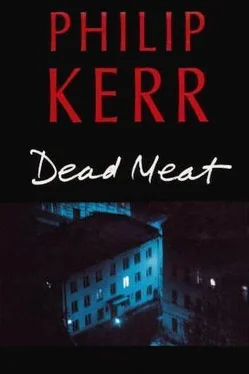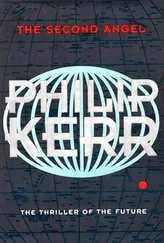‘Fine.’
‘See you later then.’
‘Now what,’ asked Grushko, ‘was all that about?’
He moved the tape on a second time.
‘And then there’s this,’ he said. ‘Our Ukrainian friend calling back on the day that Milyukin was murdered.’
‘Mikhail Milyukin, hello.’
‘It’s me, Tolya.’
‘Tolya, where have you been? I was worried something might have happened to you.’
‘Yeah well, something did happen. I got drunk last night.’
‘What again? You shouldn’t drink so much. It’s not good for you.’
‘What else is there to do? Besides it takes my mind off the other business.’
‘You don’t sound too good. It must be some kind of hangover you’ve got there.’
‘Yes. It is. Look, I was wondering if we could meet again? There’s something important that I haven’t told you about yet.’
‘Sure. Where?’
‘The Peter and Paul again. You know the restaurant there?’
‘The Poltava? Yes, I know it.’
‘I’ve booked a table for 8.30, in the name of Beria.’
‘ Beria ?’ Milyukin chuckled. ‘ Couldn’t you have chosen a different name ?’
There was a moment’s silence.
‘Why, what’s wrong with it?’
‘Nothing. Forget it. Are you sure you’re all right, Tolya?’
‘It’s just a hangover. Really, See you there. OK?’
‘OK.’
‘Well?’ said Grushko.
‘Tolya — he sounded nervous that time,’ said Sasha.
‘Very,’ agreed Grushko.
‘Now we know who Milyukin was waiting for,’ I said.
‘Imagine not knowing who Beria was,’ said Grushko. ‘Was that just ignorance? A false name Tolya just plucked out of the air? Or was it something else? A sign that Milyukin should be careful maybe?’
‘A sign which he failed to spot,’ I said.
‘I wonder,’ said Grushko. ‘Could this be our friend from the morgue this afternoon? It sounds as if Tolya might have been the owner of that liver we all enjoyed so much.’
‘If that’s so,’ I said, ‘then whoever tortured him might have wanted him to bring Milyukin to them. Maybe they had a gun pointed at his head when he made that last telephone call. So it could be that he’s not so much ill as worried. Worried that they’re going to blow his brains out when he’s finished making the call. And I suspect that’s exactly what happened.’ I paused, waiting to see if Grushko agreed.
‘Go on,’ he said.
‘They let Milyukin sit in the restaurant and then pick him up as he’s leaving. It’s nice and quiet in the fortress at night, so there’s no fuss. Persuading him to get into the car shouldn’t be too much of a problem. By that time they’d already grabbed Vaja Ordzhonikidze, so it was probably his car they were driving. Then they drive them both to the forest and shoot them.’
Grushko nodded. ‘Yes,’ he said, ‘I think that’s it. Sasha, get Andrei to ring round all the local bus and freight companies. Tell him to find out if there’s one of them which employs a Ukrainian driver called Tolya who might not have turned up for work in the last week or two.’
He noted the expression of doubt on Sasha’s face and shook his head.
‘I know that’s a pretty tall order, absenteeism being what it is these days, but we have to find out who this character was and what he was up to. Once we’ve discovered that we’ll know why Milyukin was murdered. Ordzhonikidze too, I expect.’
For another ten minutes or so, we discussed a few speculative theories as to what Tolya might have wanted to tell Milyukin. Nothing seemed particularly likely. At the same time I was impressed with the democratic way Grushko was handling this inquiry. There is an old Russian saying, ‘If I am a boss then you are a fool; and if you are a boss then I am a fool.’ It was not a sentiment that Grushko would have had much time for.
Nikolai came into the office. He was carrying some photographs.
‘Dmitri just brought in the snaps of the Georgian’s funeral, sir,’ he said and laid them on the desk in front of Grushko. There was one in particular he seemed eager to draw to Grushko’s attention. It was a picture of Dzhumber Gankrelidze, the Georgian gang boss.
‘Handsome bastard, isn’t he?’ said Grushko.
‘Funny thing,’ said Nikolai. ‘While I was interviewing Chazov just now, I knocked these on to the floor. He caught a good look at that one of Dzhumber, sir, and I swear it scared the hell out of him.’
‘Chazov’s restaurant is only a short way off Nevsky Prospekt,’ he said thoughtfully. ‘When was that firebomb actually reported?’
‘About 10.50 p.m.,’ I said.
‘Ten minutes later the State Automobile Inspectorate report Dzhumber’s green Merc on Nevsky. So he and a few of the boys could have been driving away from Chazov’s after giving him the squeeze.’
Grushko got up from his chair and went over to his cupboard. He opened the door and started to wash his hands in the little sink.
‘You know,’ he said, ‘if we were to pick the Georgians up to help us with our inquiries into the arson attack—’ he paused as he dried his hands on the towel that was hanging inside the door — ‘we might manage to help keep Sultan Khadziyev alive for a while. At least until we find him.’
His eyes met mine with a question for which I already had the answer.
‘I think that if Nikolai were to show me his papers, then an arrest protocol could probably be issued. But remember, you’ll only be able to hold them for three days.’
Grushko shrugged. ‘Perhaps our friend Chazov will be more inclined to cooperate once he finds that we’ve got the Georgians in custody. And we might actually get to charge them before our three days are up.’
He put on his jacket and straightened his tie.
‘Are you ready?’ he said to me.
I nodded and followed him to the door.
‘You’re in for a treat,’ he said. ‘Sometimes I think that I married the Winston Churchill of cooking. To do so much with so little...’
Grushko lived modestly, I thought. Too modestly, it seemed, for someone who could have been having his paw stroked. The colour television set was an old one, but not as old as the record-player. There were more books than I had expected, although many of them were medical textbooks. The sofa and armchairs were made of plastic-vinyl and in need of re-springing, while the linoleum in the tiny hallway was worn in places. About the only thing that looked new was a radio-cassette player in the kitchen and a rather gaudy set of wine-glasses that still had the labels on their bases. Of course Grushko might have been the type who was patient spending any corruptly received money. Maybe he was hoarding dollar bills underneath his mattress for a holiday abroad or, police pensions being as miserable as they were, for the day when he retired. I wondered how I might get a chance to go in his bedroom and make a quick search.
But he had not exaggerated his wife’s abilities in the kitchen. We ate a delicious cabbage soup, followed by some deep-fried cheese with mushrooms and potatoes and then a scoop of ice-cream. We drank some of Grushko’s home-made whisky, which was a lot stronger than it seemed, a discovery I was only to make the following morning.
With the exception of Tanya, Grushko’s daughter, they were a fairly typical family: the old mother who drank just a little too much of the Georgian wine I brought with me; her daughter Lena, small and neatly dressed, who ate less so that her guest could eat more and who seemed hardly old enough to have a twenty-four-year-old daughter of her own; and Grushko himself, whose strength of character and obvious authority counted for nothing in this, the most matriarchal of Russian institutions, for Lena ran the home and he knew it.
Читать дальше












